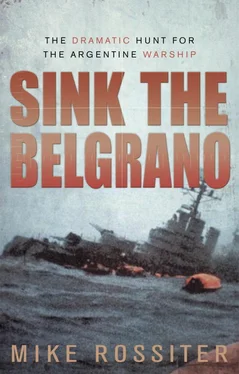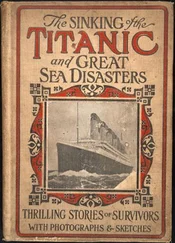Mike Rossiter
SINK THE BELGRANO
In the years following the war with Argentina in 1982, over sovereignty of the Falkland Islands, I interviewed John Nott, the Secretary of State for Defence (commonly known as the Minister of Defence) at the time, Sir Henry Leach, the First Sea Lord, Admiral Sandy Woodward, the commander of the carrier task force, and several others who served on the ships or were part of the land forces. I also read many of the books, both biographical and reportage, that had been written about the war with Argentina. Only fairly recently, however, did I fully appreciate the importance of HMS Conqueror and the other nuclear submarines that took part in the conflict. I also came to believe that the sinking of the Argentine cruiser General Belgrano was a pivotal event in the war, and that this incident had never been given the attention that it merited.
This realization occurred during a discussion I had in an almost deserted building in Whitehall on a dark winter’s day shortly after Christmas a few years ago. I was planning to produce a television series about the history of the Royal Navy called War at Sea , and I was talking to Rear Admiral Tim McClement about the possibility of a camera crew spending time on board various warships during a series of exercises called ‘The Thursday War’. As our meeting progressed we started discussing the war in the Falklands, and Rear Admiral McClement told me about his experience as the first officer on HMS Conqueror , the submarine that sank the Belgrano . I quickly forgot the purpose of my visit as I listened to a wholly new and personal perspective on the navy’s war in the South Atlantic.
Our discussions didn’t stop at the Falklands, however. For several hours I learned about the activities of British nuclear submarines before and after the war with Argentina. Throughout the years of the Cold War, up until 1989 when hostilities came to an end, the Conqueror and other nuclear submarines were engaged in a long-running conflict with the submarine forces of the Soviet Union, carrying out missions that were often so sensitive and dangerous that they had to be authorized personally by the Prime Minister of the day. After that meeting I remained intrigued by what I had been told about HMS Conqueror in the South Atlantic, the capabilities of nuclear submarines and the demands placed on the officers and crew of submarines on a patrol. I was determined to try to tell at least some of the stories that I had heard that day, although I realized that the majority of them were and would remain secret.
The opportunity to do this occurred extremely unexpectedly when I talked to my editor at Transworld, Simon Thorogood, about the scope of naval history and how much the modern navy has been influenced by it. I casually mentioned the story of Conqueror and he responded enthusiastically. We both knew that the twenty-fifth anniversary of the Falklands War was, in publishing terms, practically upon us, but if a book could be written in time it would be the right moment to publish it. Within days Simon and Transworld had confirmed their interest and I had written to Rear Admiral McClement, explaining what I wanted to do and asking for his help. The rest, dear reader, is history.
The book was not easy to research. None of the documents concerning the Falklands War is yet lodged in the National Archives. Access to them has been granted to the official historian of the Falklands War, Professor Sir Lawrence Freedman, and his findings and interpretation have been published in the two volumes of his history. I found these an invaluable source, naturally, but Sir Lawrence Freedman’s focus was not necessarily the same as mine.
My main sources had to be interviews with former crewmembers of the Conqueror , though this presented several difficulties. Some are still angry that their actions were criticized in the way that they were, which led to so many conspiracy theories about when and why the order to sink the Belgrano was given. Some have seen their views and opinions distorted by the media in the past and now refuse to give any more interviews. In order to deal with this, I insisted that all the interviews were tape-recorded, and that every interviewee had a transcript of the tapes.
But there were other difficulties as well. The events are now twenty-five years old, and the circumstances of an extremely long patrol in a submarine, where people alternate watches every six hours, inevitably mean that events are conflated and memory is very hazy. I was given access to some personal notes and papers, but not until extremely late in the day did a Freedom of Information Act Request produce the submarine’s patrol report. Only then could I unravel what seemed to be several very confusing contradictions in the personal descriptions of events.
A final obstacle, it turned out, was the traditions of the submarine service itself, coupled with old habits of secrecy from the covert nature of submarine operations during the Cold War. There are some aspects of these that people are just unwilling to talk about, and no amount of persuasion would change that.
In the end, however, people did volunteer what they could remember and what they thought it was safe to reveal. I would like to thank Tim McClement, in particular, for his help, as well as Dave Hall, Jonty Powis, Graham Libby, Bill Budding, Charlie Foy, Colin Way and Jeff Tall at the Submarine Museum. I would also like to thank Lieutenant Commander Nigel Firth and Lieutenant Commander Mark Thompson for arranging my visit to Devonport and access to HMS Trenchant , a modern Trafalgar-class submarine. I should also like to acknowledge the assistance of the Imperial War Museum Archive.
A few years after the war in the Falklands, Martin Middlebrook went to Argentina to write his book The Fight for the Malvinas . This was a very useful source, but I also wanted to form my own judgements about the behaviour of the General Belgrano and her crew. Argentina was, of course, a military dictatorship during the Falklands War, and the Argentine navy played an important role in the country’s internal oppression. I am not sure what archives of the period will be made available, or when.
However, the captain of the Belgrano , Captain Héctor Bonzo, and the Asociación Amigos del Crucero General Belgrano (Association of the Survivors of the Belgrano ) are now completely open about their orders and their mission. Everywhere I went I was met with courtesy, and my questions were answered quite candidly. Again, all the interviews were taped and contemporaneous notes were taken. I have to thank the Argentine Naval Attaché in London, Captain Carlos Castro Madero, and Captain Ulloa in Argentina for their help, and also the great assistance of Rear Admiral Carlos Barros. Captain Héctor Bonzo and Commander Pedro Luis Galazi of the Belgrano were also very helpful and reflective. I would also like to thank Norberto Bernasconi, Dr Alberto Levene, Oscar Fornes, Juan Heinze, Ruben Otero, Santiago Bellozo, Fernando Millan and Lucas Ocampo.
Thanks are also due to Pablo Touzon and Luz Maria Algranti for their sterling work, both in translating and in organizing an extremely busy schedule.
I must also thank Simon Thorogood at Transworld and my agent, Luigi Bonomi. On a personal note, I would also like to thank my wife, Anne Koch, and my two sons, Max and Alex, for their forbearance while I tried to write this book.
The attack by the Conqueror on the Belgrano was fundamental to the outcome of the war over the Falklands, but this, and what led up to it, has never been given the attention that other events in the war have received. I hope that this book goes some way to redressing that. Needless to say, any errors in the text are solely my responsibility.
Читать дальше












